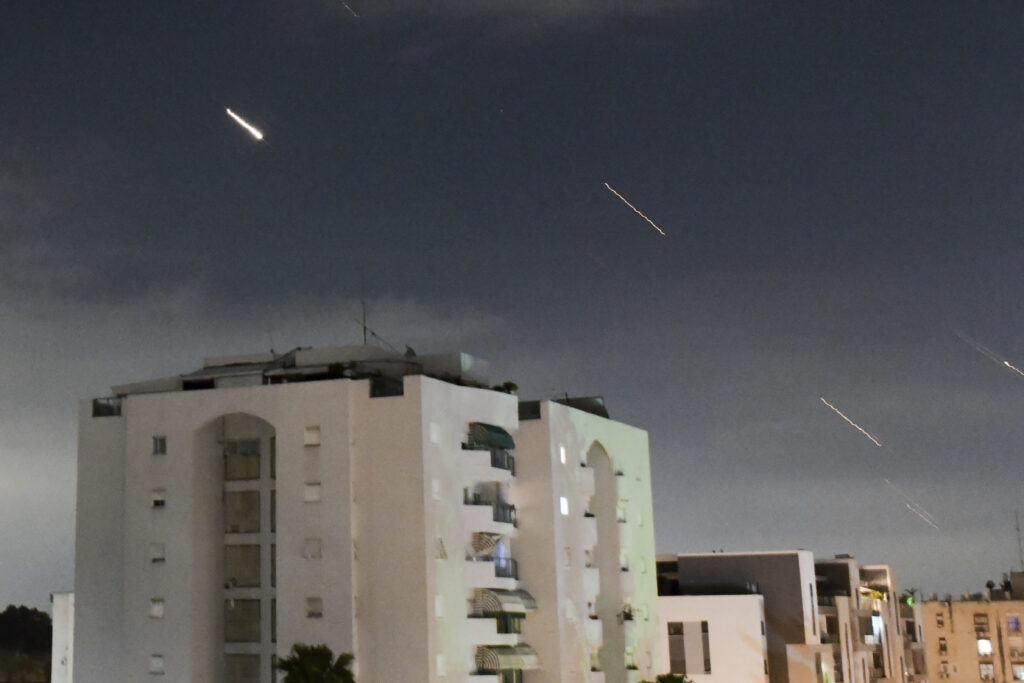
Israeli leaders are debating how the country should respond to Iran’s unprecedented aerial attack against Israel that took place this weekend.
Tehran launched more than 300 drones and missiles at Israel on Saturday night local time and into Sunday morning, the vast majority of which were intercepted by Israeli air defense systems and a coalition of allies that helped. It’s the first time Iran has carried out an attack targeting Israeli soil from within its borders.
Iran hadn’t attacked Israel directly up until this weekend, instead utilizing its network of proxy forces in the Middle East. Tehran carried out the attack against Israel in retaliation for the bombing of an Iranian Consulate in Damascus, Syria, that resulted in the death of Mohammad Reza Zahedi, a senior Islamic Revolutionary Guard Corps general, and a handful of others.
While Iran put its arsenal on display with the rockets and missiles it fired, Israel’s layered air defense system, with support from allies, proved very effective. Israeli and U.S. officials said, in total, they were able to intercept 99% of the fired munitions, many of which did not even reach Israeli airspace.

The lack of significant damage and casualties will likely play a major role in how Israel chooses to respond, even though leaders warned they would retaliate if Tehran carried out an attack.
President Joe Biden and his administration do not want to see Israel go to war against Iran, and they are hoping to lower the temperature between the two adversaries.
“We don’t want a war with Iran,” National Security Council coordinator John Kirby said on CNN on Monday morning. “We don’t seek to widen and broaden this conflict. We don’t want to see things escalate. As a matter of fact, what we want to do is see things de-escalate. And defending Israel the way we help do on Saturday should have that effect.”
“There’s no question that what Iran tried to do, and I emphasize the word, ‘tried’ to do, was an escalatory step, no question. I mean, it was an unprecedented aerial attack from Iranian soil to Israeli soil. We haven’t seen that,” he added. “I mean, that’s a huge step in the wrong direction.”
A senior administration official told reporters over the weekend that the United States does not “envision” participating in an Israeli retaliation, explaining that “no one wants to run up the escalation ladder.”
However, former Defense Secretary Mark Esper told the Washington Examiner that Israel has to “strike back hard” to restore deterrence.
“I think the scale and scope for the attack was disproportionate to the initial strike by the Israelis in Syria, and I think it risks changing the dynamic of how both countries face off against one another in a very dangerous and negative way for Israel in the region,” he explained. “So my view is Israel probably has to strike back hard and try to reestablish deterrence and make sure the Iranians know that they can’t strike Israel, with 300-plus missiles and drones with impunity.”
While Esper acknowledged “nobody wants to see a wider war,” he warned that if “Israel doesn’t strike back forcefully, then they’re going to change the dynamics” of deterrence, which “is far more dangerous.”
Former U.S. Central Command Commander Frank McKenzie said on CBS’s Face the Nation that Israel has several targets “both inside Iran and outside Iran” they could choose from, though he said that if he were still in that role, he would advise Israel to show “restraint.”
“There will be voices that will urge the Israelis to take out the Iranian nuclear program, which I think is a false chimera anyway. But I would argue that if you’re going to do something, and they may have to do something, I would be precise, I would be short,” he said. ” But sometimes, when you’re in that position, showing some restraint is the best strategic option that you can take.”
Iran’s proxy forces have attacked Israel and U.S. interests in the Middle East in recent months.
Two of those groups — Hamas, which is based in Gaza, and Hezbollah, which is in Lebanon — have battled Israeli forces for months. Hamas’s Oct. 7 terrorist attack in Israel, which entailed the killing of roughly 1,200 people and the kidnapping of roughly 250 others, ignited the conflict in the region. As Israeli forces take on Hamas in the Gaza Strip, Hezbollah has exchanged rocket and missile fire with Israel, but it has not devolved into a full-blown war.
CLICK HERE TO READ MORE FROM THE WASHINGTON EXAMINER
Israel has gotten international support in the aftermath of Iran’s attack, a dramatic change from the frequent criticism the country has received for how it has conducted its war against Hamas.
The United Kingdom, France, and Germany all urged Israel not to retaliate militarily to avoid escalating the conflict.







